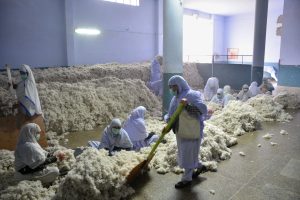The World Bank recently released a comprehensive review of Pakistan’s poverty and welfare trends since the early 2000s. The assessment has raised concerns about Pakistan’s economy, saying that the country’s once-effective poverty alleviation efforts have stalled and, in some cases, reversed. The report, titled “Reclaiming Momentum Towards Prosperity: Pakistan’s Poverty, Equity and Resilience Assessment,” explains that the country’s current growth model is struggling to deliver the reforms needed to lift millions out of poverty.
In the World Bank’s assessment, a significant wave of urbanization between 2001 and 2015 lowered Pakistan’s national poverty rate from 64 percent to 22 percent by 2019. This decline in poverty was primarily driven by rural workers taking new jobs in cities in sectors like trade, construction, and transportation.
The report also highlights that feeble economic reforms have left 42 percent of Pakistan’s aspiring middle class struggling to stay afloat. This is mainly due to the ongoing rapid urbanization’s inability to generate enough stable employment opportunities.
This situation, the report notes, has been worsened by the increasing frequency of natural disasters and pandemics. The assessment finds that the COVID-19 pandemic triggered a massive post-2020 reversal in efforts to reduce poverty in Pakistan; the country’s national poverty rate rose from 18.3 percent in 2022 to 25.3 percent in 2024-2025, a 7-percentage-point increase in poverty over just three years, which roughly translates to approximately 17 to 18 million additional people being pushed below the national poverty line during the last five years.
In addition, there were at least two major floods in the last three years. As a result, there has been a sharp rise in inflation over the past five years, along with increasing macroeconomic pressures.
The report also highlights several human capital gaps. The assessment notes that challenges rising from poverty are affecting millions of young people and families, who are increasingly finding it difficult to ensure their children attend, stay in, and learn at school. Pakistan currently has the world’s second-highest number of out-of-school children after Nigeria. Roughly 22.8 million children aged 5 to 16 do not attend school in Pakistan. Furthermore, schools in Pakistan have frequently been closed due to climate-related emergencies, such as heatwaves in 2024, flooding in 2022 and 2025, and smog-related crises.
Over the past two years, Pakistan’s economy has been on a stabilization path as part of the International Monetary Fund (IMF) program. However, this stabilization effort has not been enough to help people come out of poverty, increase incomes, or prevent millions from falling below the poverty line. The country has been slow to implement meaningful reforms, such as imposing fair taxes, privatizing struggling government-owned companies, fixing power sector losses, and increasing transparency in governance. Additionally, the current government’s promises to reform bureaucratic practices and curb corruption appear to have stalled.
Pakistan has faced economic troubles for years, which have forced it to turn to the IMF for help at least 23 times. The country’s debt has continued to grow compared to its economy. Interest payments consume a lot of revenue, leaving little to be spent on people’s welfare or to support the private sector.
The World Bank’s report suggests several ways to put poverty reduction efforts back on track and restore economic progress. The international lender has advised Pakistan to invest in people and create opportunities to tackle human capital gaps, particularly for the most disadvantaged segments of society. It has also called on the government in Pakistan to adopt progressive fiscal policies by enhancing local financial systems.
The report also advised Pakistan to eliminate ineffective and costly subsidy programs and prioritize targeted investments for the poorest segments. Finally, it recommends investing in real-time data systems to inform decisions, allocate resources effectively to target resources and monitor outcomes.
Clearly, overcoming Pakistan’s halted progress on poverty will require decisive and unified action, which is essential for any policy approach aiming for prosperity.




























